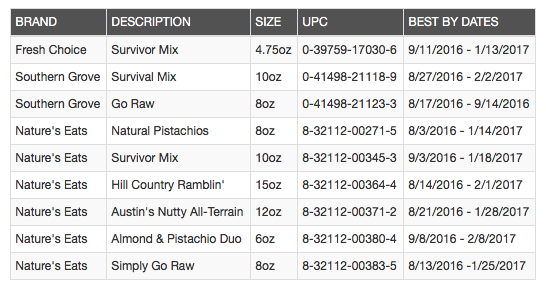When folks try to limit recall size and scope without good traceability and sanitation clean breaks they usually aren’t successful. One recall announcement turns quickly into multiple and leads to larger questions about overall systems.
Last year, during the Blue Bell’s outbreak response and recall Marler and I both highlighted the issue of recall creep:
“Maybe the cleaning and sanitation program that Blue Bell was using wasn’t adequate. As more samples came back … it highlights that this problem was larger than they originally thought.”
“Limiting the recall might seem like a good idea. But then if you keep expanding your recall, it’s a death by a thousand cuts. You look like you’re dragging your feet.”
Traceability, sanitation, product lots, suppliers, ingredients. All this stuff, if not managed well, especially as investigators start asking for documentation, leads to recall expansion.
Here’s today’s recall creep example, care of Texas Star Nut & Food Company:
The above listed products, were distributed to Retailers nationwide. These products were sold between 8/13/2015 and 2/24/2016.
The company has ceased the distribution of all of the above products containing pistachio kernels. The recall was as a result of a routine, random sampling program conducted by a FDA third party contracted lab which revealed that the Nature’s Eats Natural Pistachio Kernels product contained Salmonella.
Consumers who have purchased any of the above listed products and best by dates are urged to discontinue consuming the potentially affected product and may return product to the retail location for a refund. Consumers with concerns or questions should contact the company at 1-844-571-5555 from 8:30am to 5:30 pm Central Standard Time.

